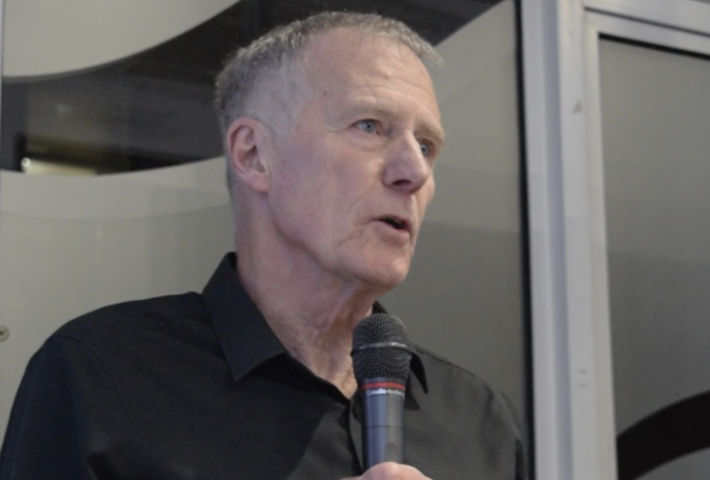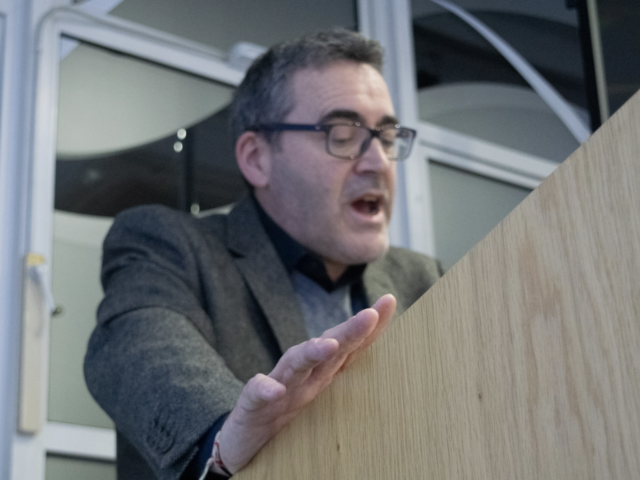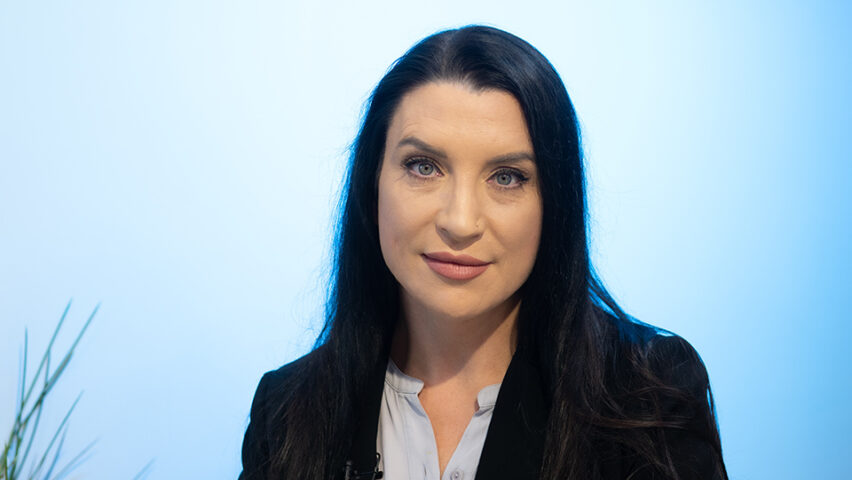Free Speech Ireland held a public event after the launch of their ‘Bin the Bill’ campaign to combat Minister for Justice Helen McEntee’s Criminal Justice (Incitement to Violence or Hatred and Hate Offences) Bill 2022, which is expected to make its return to the Seanad in March.
The event featured contributions from Denis Hayes of Academics for Academic Freedom, Senator Rónán Mullen, UCD Lecturer/Assistant Professor School of Philosophy Tim Crowley, Laoise de Brún of The Countess, journalist Theo McDonald.
‘NO FREE SOCIETY WITHOUT FREEDOM OF SPEECH.’
Denis Hayes kicked off the speeches saying how he is often asked to comment on the state of free speech to which he said he usually replies that it’s “dire”
Commenting on creeping encroachments on the right to free speech and expression he said that there existed a bad faith argument that if one stands up to defend this right they are doing so simply because they wish to ‘spread hate’ and not because they are motivated by a desire to defend freedom.
He pointed to academic arguments in support of the protection of free expression saying that if one wished to fight against “so-called hate speech” the best way to do that was by using more and “better” speech to combat it.
There is afterall, he said, ‘No free society without freedom of speech.’

He said that the “ bottom line” of the argument is that any infringement on that freedom of speech “is always worse and more dangerous to our society than the most egregious abuse of freedom might be.”
‘Hate’, he said, should be resisted with free speech and not censorship,’ adding, “The very concept of hate speech is irreducibly riddled with ambiguity, conflicts and confusion” he said, adding that if you restrict free speech, “you’re doing away with democracy.”
“PROFOUNDLY DANGEROUS” HOW HATE SPEECH BILL WILL FEED INTO EUROPEAN LEGISLATION – AND A “TACTIC OF PROGRESSIVE POLITICS”
Senator Rónán Mullen commented on the atmosphere within the Irish government saying that his fellow senator, Michael McDowell had said that two referenda were being “rushed” through.
Mullen said that four stages of one referendum had passed through the senate in one day and that much of current law making was simply “the politics of gesture and symbol” over “substance and rationality most of the time.”
He said it was “profoundly dangerous” how hate speech bill “will feed into European legislation” as a form of test legislation in order to see how freedoms could be restricted in this area.
Referring to the importance of freedom of speech he said, “There are also laws inbuilt in our nature that require the utmost respect,” he remarked, adding that, “one of these is freedom of expression.”
He said that since public debate had largely moved online, political discourse was no longer in the control of the mainstream media and that any law that attempts to limit online discourse could only be welcomed by legacy media outlets.
Mullen pointed to the importance of the “right to offend” and how preported attempts to protect the feelings of certain people were in no way comparable to the importance of freedom of speech.
He said that people had a duty to engage in discourse with each other and that in the absence of the ability to express oneself freely, this could not take place.
Referring to government attempts to curtail freedom of expression he said, “It is a tactic of progressive politics, be they right or left, to seek to silence opposing voices,”
“Communism did that effectively, modern ‘woke’ communism seeks to wield similar power to deplatform the ‘oppressor’,” he added.
Now “free speech is seen as an unwelcome obstacle,” he said.
Mullen pointed to a 2022 “extensive campaign to promote awareness of hate crime” by the Gardaí which had only managed to collect 72 reports despite the campaign providing a very low-bar criteria for so-called ‘non-crime hate incidents; meanwhile in the same year there were 57,000 thefts and 22,000 assaults recorded.
POSSIBLE IMPACTS ON ACADEMIC FREEDOM: STUDY OF GENOCIDE
UCD lecturer Tim Crowley spoke of the bill’s possible effects on academic freedom citing cases from abroad such as Perinçek v. Switzerland which is related to the contested issue of the Armenian Genocide.
He said that the bill could lead to academics being forced to accept “state mandated” versions of historical events.
Crowley pointed out how differences in laws surrounding speech meant that an academic discussing issues related to the Armenian Genocide had landed him in court in Switzerland while in Turkey and Azerbaijan it is both states’ position that there was no genocide.

Pointing to the ‘mistaken belief’ that restrictions on speech could have prevented the Holocaust, – saying this was a view recently expressed by Fianna Fáil senator Lorraine Clifford Lee –
Crowley spoke about how pre-Nazi Germany had laws restricting free speech and that the opposite was more likely true when historical evidence was taken into account.
He said that Clifford Lee had claimed that “hate speech” had contributed to the Holocaust and by that token that the atrocity could have been avoided if restrictions on speech had been in force.
He said this idea was an example of the ‘Weimar fallacy’ which is the idea that the growth of the Nazi party was enabled by a lack of laws restricting speech.
“This is just not backed up by historical evidence he said,” adding that the Weimar Republic were “hardly sitting on their hands during the 1920s,”
Crowley argued that historical laws restricting free speech had only served to allow the Nazis to appear as victims of state oppression and had fed into narratives that communists and Jews were somehow oppressing the “real” German people.
He pointed to Adolf Hitler ‘having been banned from speaking in public for two years in the 1920s’.
GENDER-CRITICAL THINKERS DISMISSED AS “HATEFUL” AND THE ERASURE OF FEMALE-ONLY SPACES
CEO and founder of The Countess, Laoise de Brún BL, spoke of how the law was intended to instil fear and lead the public to self-sensor for fear of Gardaí showing up at their homes to search them and seize personal devices.
Speaking of how online discourse was vital in efforts to speak truth to power she said that “cosy relationship” between journalism and source or power were shown to have grave consequences such as in the case of the reporting on the Bloody Sunday massacre.
Pointing to the work of UK journalist Simon Winchester, de Brún said he was the only journalist who reported on Bloody Sunday “what he saw with his own eyes.”

“Writing for The Guardian, he said that the British Army opened fire first, every other journalist went to their sources in the British military and said what they were told to say,”
She added that journalists “were censored top down, but there was also a self-censorship which is insidious, and which is often unconscious.” she said.
She spoke about how political establishments use control of narratives surrounding events to influence public opinion pointing to the 2018 example of when a group of lesbians held a peaceful protest of a London gay pride event.
She said the Mayor of London has accused the women of ‘hateful conduct’ but that no questions had been asked as to why they were protesting or in what way their protest was ‘hateful’.
She said that the introduction of the new hate speech laws was nothing more than a political “agenda being furnished” and spoke of the far reaching consequences of making it an offence to have “certain tweets on one’s phone” or “certain pamphlets” in one’s possession, even where neither have been made public.
de Brún pointed to the media’s acquiescence to the belief that “trans-women are women”, saying anyone who understands that humans cannot change sex and questions this line is simply dismissed as being entirely motivated by “hatred”.
She said equality for women and girls is predicated on their having single sex provision in certain areas of life, “from intimate spaces, to sports, to shelters, to prisons.” and that the inability to enjoy freedom of speech would greatly impede on women and girl’s ability to defend themselves from the harmful effects of gender ideology.
de Brún said that once the presence of trans-identified males was permitted these rights are erased because previously single-sex spaces became “de facto mixed sex.”
“CHICKENS FOR KFC” – “EVERY SINGLE JOURNALIST IN IRELAND SHOULD BE AT EVENTS LIKE THIS,”
Journalist Theo McDonald who has had articles published in The Hill, the Irish Mirror,The Sunday Independent and The New York Post spoke of the bill having a “chilling effect” on free speech.
Giving the of example of the Wuhan lab leak theory for the origins of corona virus, he pointed to the writings of John Stuart Mill saying that because ‘nobody knows the truth there is a danger that censoring freedom of speech is censoring the truth,’
McDonald said that many narratives that were called ‘false’ during the covid era are now being accepted as being based in fact.
“Recently the FBI and US Energy Department did confirm that covid did perhaps emerge from a laboratory at the Wuhan Institute of Virology, yet individuals who proffered this theory were silenced and called conspiracy nuts,” he said adding that “the idea anyone knows with absolutely certainly what the truth is and as such should be allowed to dictate the discourse is a fallacy,”
He added that this was “exactly” what the Irish state “feels the need to do”.
He said that as a journalist it was his job ‘to engage in free speech’ and a situation where he had to worry about offending “woke overlords or other special interests” he would be rendered “literally” unable to do his job properly.
“A lie today may be the truth tomorrow,” he said,
Saying that “every journalist in Ireland should attend events like this,” he remarked that “the spectre of media commentators actually defending this bill baffles and enrages,” him.
He added,“It’s like chickens advocating for more KFC restaurants,”
This article is a repost from Gript.ie
